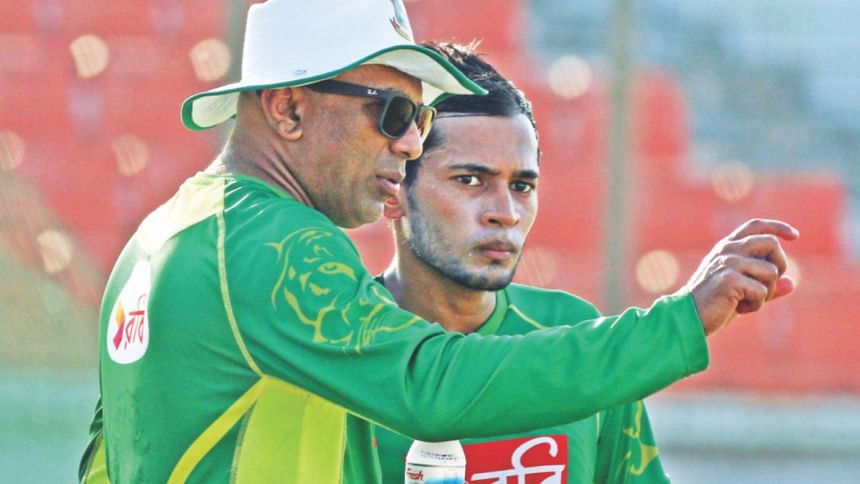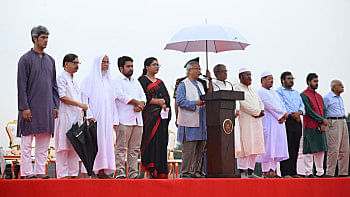Why fault only Mushfiqur?

The Australians make it a point to target visiting captains, because with the captain taken out the ship becomes rudderless. On the current tour of South Africa, however, it seems that the Bangladesh captain has been targeted not by the opposition, but from within. While there was little chance that Bangladesh would draw or win the just-concluded Test series, internal politicking has created a poisoned atmosphere that seems to have manifested in an utter lack of will to fight -- because the captain has been taken out.
Reports have emerged that the Bangladesh Cricket Board (BCB) are thinking of sacking Mushfiqur, but as is often the case with the BCB, they may be trying to save face because it has been learnt that Mushfiqur was himself on the verge of waving the poisoned chalice goodbye, not just on this tour but for a while now. That is lent further support by the fact that there is no ready alternative to Mushfiqur -- Shakib Al Hasan's Test commitment is uncertain, Mahmudullah Riyad's Test place is uncertain and Tamim Iqbal has said before that he is not interested in the captaincy.
Whether it was a sacking or a resignation that was looming, for the time being it has been deferred as Mushfiqur seemed to be towing the company line after the innings and 254-run loss against South Africa.
There is precedence for Mushfiqur taking such a step, he had announced his resignation after the ODI series loss on the tour of Zimbabwe in 2013. But by his own words, Mushfiqur's discontent this time is not about team performance but about the lack of respect from those who are supposed to be his partners in the dressing room.
It does not take a detective to know that Mushfiqur is facing pressure from the coaching staff to the extent that no serving captain should have to face. After the first day of the second Test in Bloemfontein on Friday, he made it a point to come out to answer questions -- although captains do not usually do that on the first day -- and seemed to be waiting for someone to ask the question of why he was fielding in the deep for large parts of the day instead of in the infield where he could guide his wayward bowlers.
"The coaches wanted me to field in the deep because they feel I give away runs or drop catches in the infield. I tried to abide by their instructions. You have to do what the team management tells you to do," he said pointedly.
While the knee-jerk reaction would be to ask why a captain would be cowed by a mere coach's instructions when leading his troops on the field of battle, that ignores the authoritarian manner with which head coach Chandika Hathurusingha has been running operations behind the scenes. No less a man than Mashrafe lost the will to fight against the barrage of reminders of his age and exited T20I cricket in Sri Lanka earlier this year.
While Mushfiqur is in no way a great captain -- his field placings and lack of involvement are at times astonishing -- but it should never have come to this. An international captain, no matter how good or bad, should never have to hear from coaches that he should not be in the infield leading his side, or anything approaching that suggestion. A team should never have to see their captain being treated thus.
Even if Bangladesh's cricket is not developed to the highest standard, players like Mashrafe and Mushfiqur have done a fair sight more than Hathurusingha can ever do for the country as a coach, but in his authoritarianism he has displayed disrespect for the cricketing culture he works in. It was Mashrafe on the field when Bangladesh progressed to the quarterfinals of the 2015 World Cup, when they won series over India, Pakistan and South Africa. It was Mushfiqur, and not Hathurusingha, who insisted on spinning wickets in Chittagong and Dhaka that delivered a historic Test win over England and a drawn series in 2016. That was also the blueprint that delivered the drawn series against Australia before this tour.
Hathurusingha, however, is a mere man. As an institution, the BCB have given Hathurusingha full freedom to do as he pleases with the team but has not empowered captains like Mushfiqur and Mashrafe to have their say and be heard. Even though Hathurusingha does not stick around in the country between international assignments to look at the domestic talent, he is part of the selection process whereas the captain only has a 'representative' in the process. And if Hathurusingha is given full freedom, why is he not held fully responsible and accountable when results like yesterday's happen.
As an outsider, maybe Hathurusingha's condescension can be understood, but the BCB's complicity shows a lack of respect for the cricketing culture they profess to serve that is altogether more damning.

 For all latest news, follow The Daily Star's Google News channel.
For all latest news, follow The Daily Star's Google News channel. 








Comments